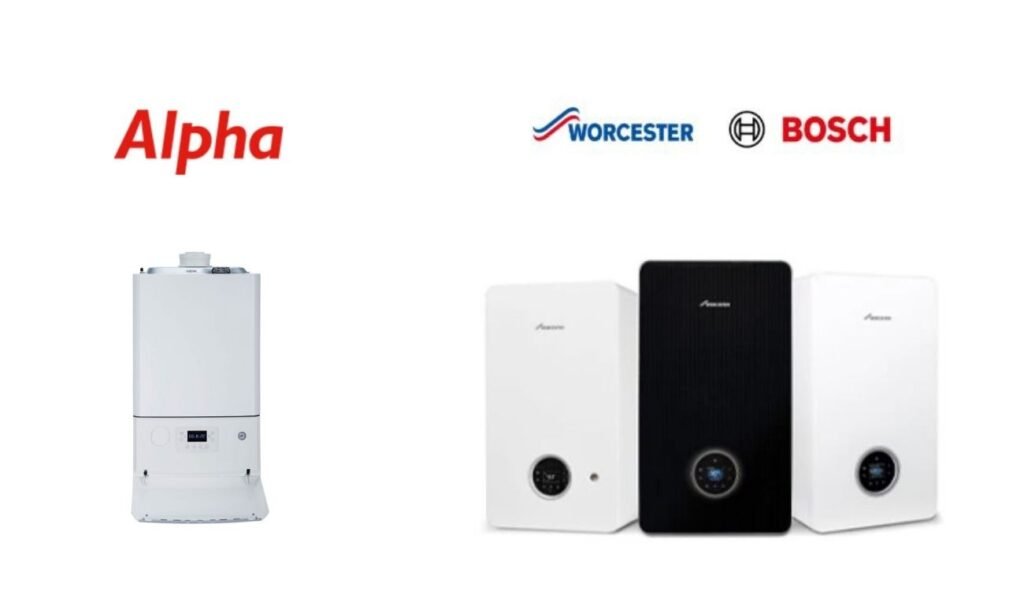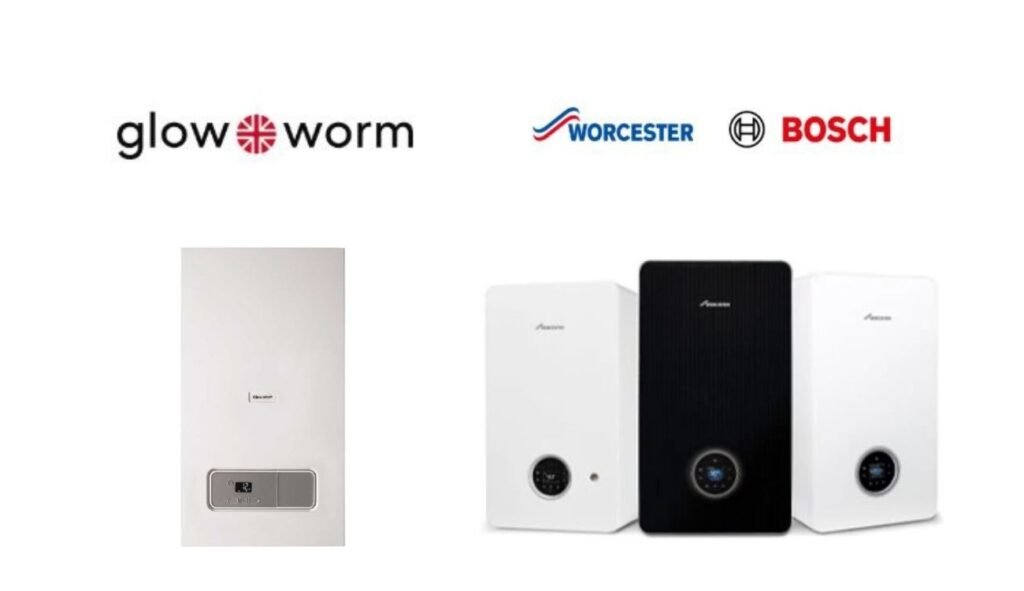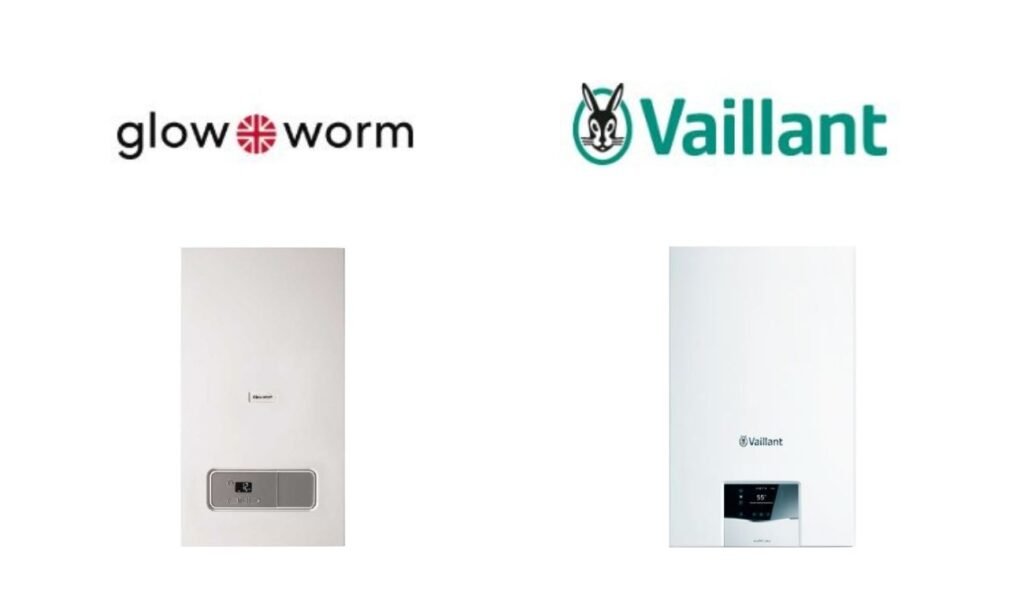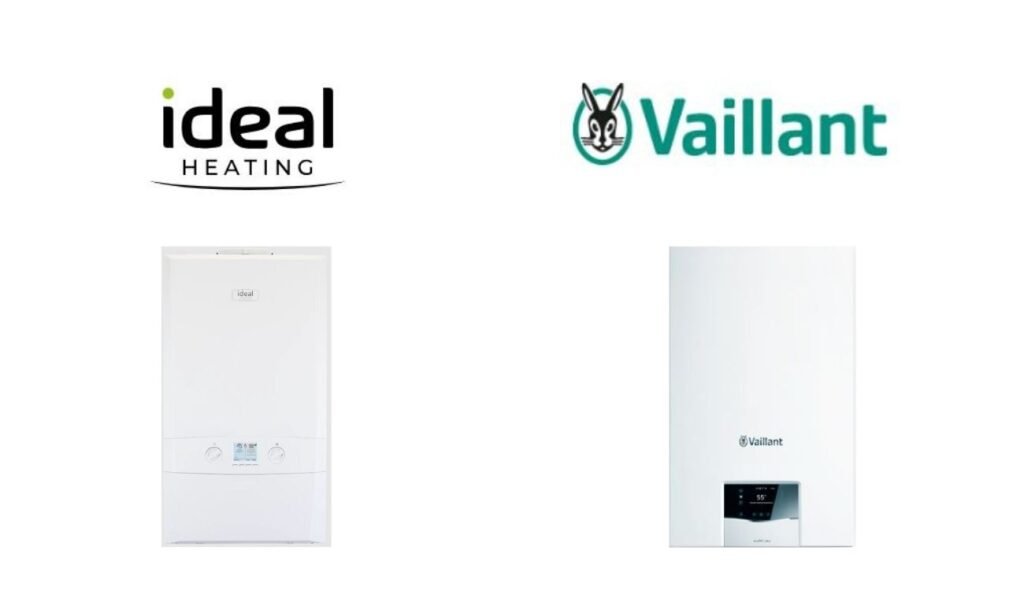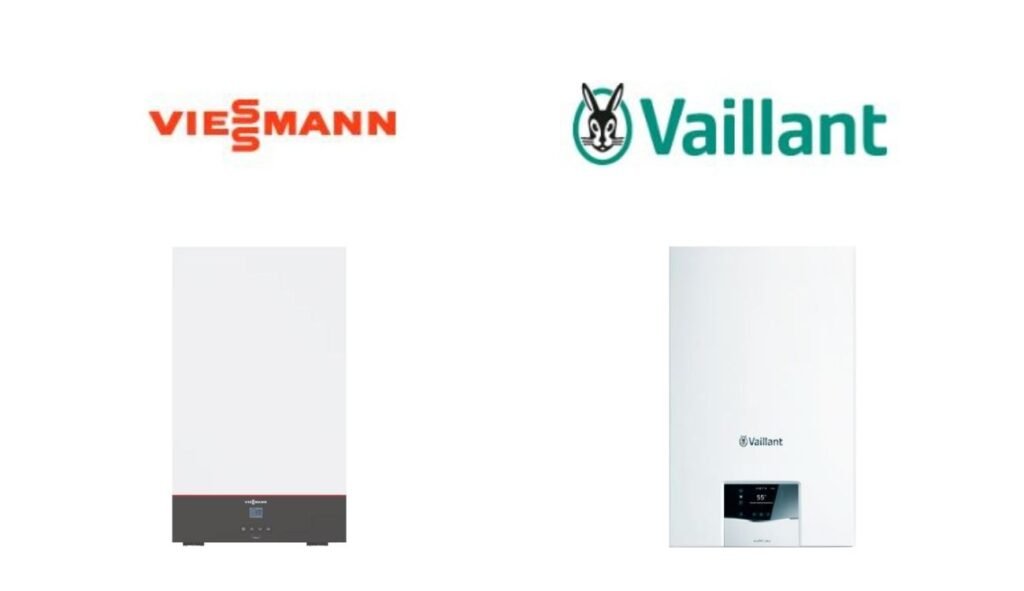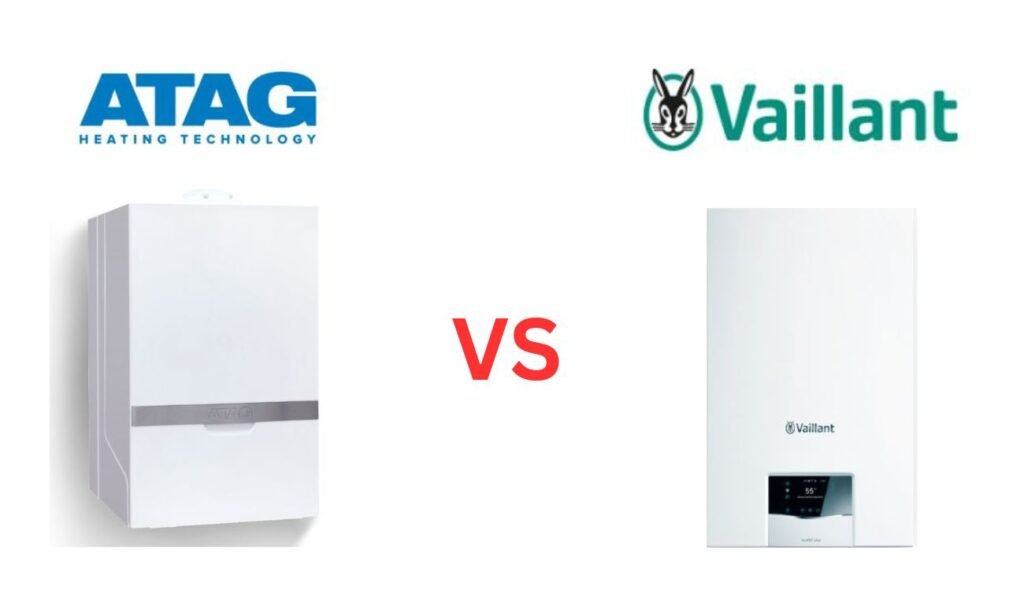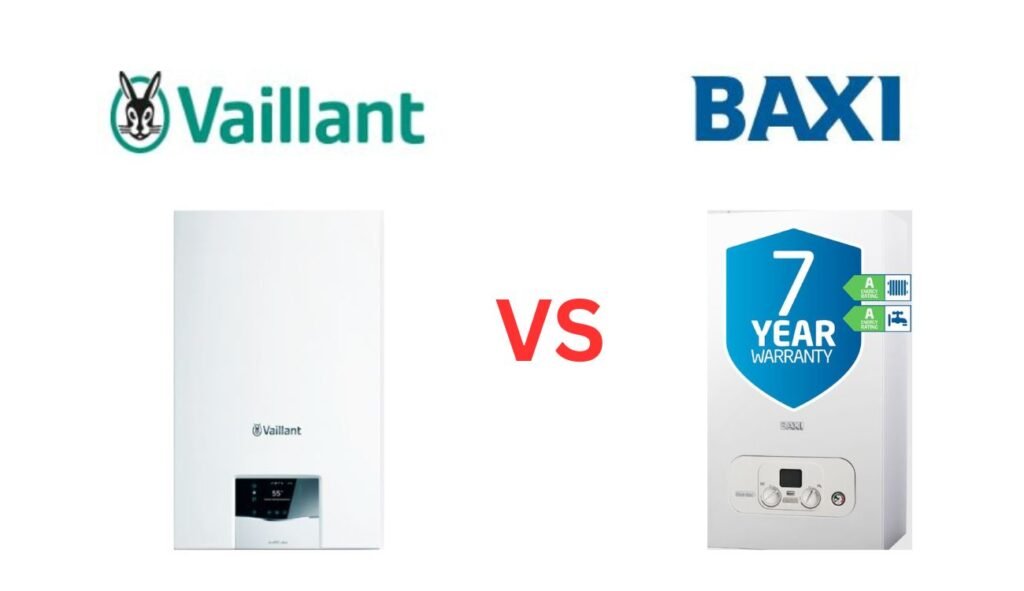Not sure whether to choose a system boiler vs combi boiler for your home? Combi boilers tend to be better for smaller homes, whereas system boilers are generally better for bigger homes with higher hot water demands.
This guide will help you understand what they are, key differences, costs and efficiency so you can decide which boiler type fits your needs best.
System Boiler vs Combi Boiler: What’s the Difference?
What is a Combi Boiler?
A combi boiler stands for a combination boiler. It is a compact heating system that provides both heating and hot water in one boiler unit.
This type of boiler heats water on demand directly from the mains supply, ensuring immediate availability whenever you need it. Combi boilers eliminate the need for a separate hot water storage cylinder, making them efficient and space-saving for smaller homes.
Pros and Cons of Combi Boilers
Pros of Combi Boilers
- Hot water on demand – Heats water instantly without the need for a storage tank.
- Space-saving design – Compact size allows installation in tight spaces like kitchen cupboards.
- No hot water cylinder needed – Eliminates the need for a separate hot water storage tank.
- Cost-effective – Generally more affordable to install and operate for homes with modest hot water usage.
- Ideal for smaller homes – Best suited for properties with fewer bathrooms and lower hot water demand.
Cons of Combi Boilers
- Dependent on mains water pressure – Performance can suffer in homes with low or inconsistent water pressure.
- Limited simultaneous use – Typically can only supply hot water to one outlet at a time, which may not meet the needs of larger households.
- Not ideal for high-demand homes – May struggle to keep up with multiple taps or showers running at once.
What is a System Boiler?
System boilers operate differently by using a hot water cylinder to store heated water. This allows system boilers to supply hot water to multiple taps simultaneously without compromising water pressure.
The inbuilt pump-in system boilers ensure a steady flow of hot water, regardless of the mains pressure, making them suitable for larger households with higher hot water demands.
Recognising these fundamental differences helps you appreciate the unique benefits each type offers and how they match different household needs.
Pros and Cons of System Boilers
Pros of System Boilers
- Great for large households – Can supply hot water to multiple outlets (taps and showers) at the same time without a drop in pressure.
- Consistent water pressure – Maintains strong pressure even during simultaneous use.
- Reliable hot water supply – Uses a hot water cylinder to store heated water, ensuring availability when needed.
- No need for a cold water tank – Works as part of a sealed system, which can simplify the setup compared to conventional boilers.
Cons of System Boilers
- Requires more space – Needs room for a hot water storage cylinder, making it less ideal for smaller homes or flats.
- Potential for wasted hot water – If the stored hot water isn’t used, it can lead to energy inefficiency and waste.
- More complex installation – Installation is typically more involved and can be more expensive than combi boiler systems.
Combi Boilers vs System Boilers: An In-Depth Comparison
The most significant difference between combi boilers and system boilers lies in their operational mechanisms. Combi boilers heat water on demand, ensuring that hot water is available instantly whenever you need it.
On the other hand, system boilers store heated water in a cylinder, allowing them to supply hot water to multiple outlets simultaneously without any drop in pressure. When choosing between a system or combi boiler, it’s essential to evaluate your specific needs.
Space is another vital factor to consider. Combi boilers are compact and do not require a separate hot water storage cylinder, making them ideal for homes with limited loft space. Conversely, system boilers require more installation space due to the need for a hot water cylinder, making them better suited for larger homes.
This distinction can be a deciding factor for many homeowners, especially those living in smaller properties where space is at a premium and less room is available.
Ultimately, choosing between a combi and a system boiler depends on specifics like the number of radiators, bedrooms, and bathrooms in your home.
Knowing these key differences helps you make a more informed decision aligned with your requirements.
System vs Combi Boiler: Cost Comparison
When it comes to costs, both the initial purchase and installation expenses need to be considered. The cost of buying and installing a new combi boiler typically ranges from £900 to £3,500, with the average price falling between £1,500 and £4,500.
In comparison, the cost of purchasing and installing a system boiler usually falls between £2,100 and £3,300 but can sometimes rise to £5,000 depending on various factors.
While the initial installation costs for system boilers are generally higher due to the need for additional components like a hot water cylinder, homeowners may be eligible for financial aid through schemes like the Energy Company Obligation (ECO) if they meet specific requirements.
Considering these cost differences is necessary for budgeting and planning your boiler investment.
At Future Heat, we make the process simple. Whether you’re leaning towards a combi or system boiler, request your free personalised boiler installation quote today, and let our trusted local experts in Newcastle and the North East help you choose the best option for your home.
Running Costs of Combi Boilers and System Boilers
Running costs are another critical aspect to consider. Combi boilers are generally more energy-efficient, potentially leading to lower combi boiler running costs, especially for households with moderate hot water usage.
For a combi boiler consuming 12,000 kWh annually, the estimated running cost is around £840. Upgrading to a high-efficiency model can significantly cut energy bills, potentially saving up to £490 a year.
However, if your household regularly uses large volumes of hot water, a system boiler may be more cost-effective. This is because system boilers can supply hot water to multiple outlets simultaneously without affecting water pressure, making them more suitable for larger homes with higher hot water demands and hot water on demand.
Additionally, a hot water heat exchanger can enhance the efficiency of the system to store hot water.
Combi Boilers vs System Boilers: Efficiency
Modern combi boilers and system boilers are designed to be highly efficient, with many models achieving energy efficiency ratings of 90% and above.
For example, some electric combi boilers can reach efficiency ratings of up to 99%-100%. This level of efficiency translates to significant savings on heating bills and a reduced carbon footprint.
System boilers are also highly efficient, with some models like the Viessmann Vitodens 200-W achieving efficiency ratings of up to 98%. Upgrading to a modern best-system boiler can result in substantial annual savings, a considerable reduction in carbon emissions, and minimised heat loss, especially when integrated into a central heating system.
Both types of boilers often incorporate condensing technology to maximise energy efficiency and minimise environmental impact.
The use of this technology is mandatory in the UK, with condensing boilers and combi boilers being essentially the same thing, which also goes for system boilers.
Installation Considerations for Combi and System Boilers
Installing a combi boiler is generally quicker and less complex than installing a system boiler. Combi boilers do not require a separate hot water storage system, making them space-efficient and easier to hide in places like kitchen cupboards.
However, issues may arise when using a combi boiler in older homes due to potential water pressure damage to older heating systems and pipework.
By comparison, installing a system boiler requires more complexity due to the need for additional components like a hot water cylinder. This installation process typically requires substantial space and can take from one to three days, depending on the complexity of the existing setup.
Replacing an old system boiler with a new one is usually straightforward, whereas switching from a combi boiler to a system boiler may require reconfiguring the pipework. Being aware of these installation considerations helps you prepare and ensure a smooth transition to your new boiler system.
We specialise in handling boiler installations of all complexities. Whether you’re upgrading your current setup or switching systems entirely. Request your free boiler installation quote today and let our expert team ensure everything runs smoothly from start to finish.
Combi vs System Boilers: Maintenance and Repair
Combi boilers generally require less frequent servicing compared to system boilers, making them more cost-effective in the long run. Regular maintenance can prevent issues like low water pressure, which can affect their efficiency.
However, system boilers typically have higher maintenance costs due to their additional components and the complexity of their systems.
Because system boilers rely on both the boiler and a hot water cylinder, repairs can take longer due to the need to diagnose multiple parts. Before selecting a boiler, it’s advisable to consult a professional to ensure that the chosen type meets your household’s specific needs.
Compatibility with Renewable Energy Sources
Both combi and system boilers can be compatible with renewable energy sources like solar thermal systems, enhancing energy efficiency. Solar thermal panels can provide hot water and support heating needs when connected to compatible boiler systems, significantly decreasing reliance on traditional energy sources.
While combi boilers can work with solar panels, they usually require additional components for effective integration. Modern boilers paired with solar panels can enhance energy efficiency by utilising solar energy for heating purposes, leading to substantial energy savings.
Choosing the Right Boiler for Your Home
Selecting the right boiler involves considering the size of your property and your household’s hot water demands. For multiple bathrooms, ensure you have a boiler that can supply hot water to several outlets simultaneously.
System boilers generally suit larger properties with higher hot water needs, whereas combi boilers are ideal for smaller homes with lower demands.
Space considerations are also important. Ensure you have enough space for a hot water cylinder if you opt for a system boiler. Consulting a Gas-Safe engineer or a professional heating engineer can provide a personalised assessment tailored to your specific needs, ensuring you choose the right boiler for your home.
Frequently Asked Questions (FAQs)
A combi boiler is often considered slightly more energy-efficient, achieving up to 99%-100% efficiency compared to a system boiler’s 98%. If you’re looking for the most energy-saving option, a combi boiler might be the way to go.
On average, installing a new combi boiler will set you back between £1,500 and £4,500, while a system boiler usually costs between £2,100 and £3,300, potentially going up to £5,000 based on certain factors. Keep these ranges in mind as you plan your boiler installation.
TCombi boilers can struggle to provide enough hot water for multiple bathrooms at the same time, so if you have several, a system boiler might be a better fit for your needs. This is also why combi boilers and conventional boilers are often compared, as the use of a water storage tank in a regular boiler makes it more suited to bigger homes.
Combi boilers are easier to maintain and usually cost less for service than system boilers, which have more parts and complexity. So, if you’re looking for a simpler option, a combi boiler might be the way to go.
Absolutely, combi boilers can work with solar panels, but they often need some extra components for them to function well. Pairing them can boost your energy efficiency, too.
Our Verdict
Wrapping things up, both combi boilers and system boilers have their unique advantages and potential drawbacks. Combi boilers are ideal for smaller homes with lower hot water demands, offering space efficiency and cost-effectiveness.
In comparison, system boilers are better suited for larger homes with higher hot water needs, providing a continuous supply to multiple outlets simultaneously.
When choosing the right boiler for your home, consider factors like the size of your property, hot water demands, installation space, and maintenance requirements. Consulting a professional heating engineer can provide valuable insights and ensure you make an informed decision. Ultimately, the right choice will depend on your specific needs and preferences.
Jamie Maguire is Managing Director at Future Heat Ltd, the UK-based renewable energy company specialising in heat pumps, solar panels and energy-efficient boiler solutions. He leads the company’s strategic vision to decarbonise homes and businesses across the UK by delivering innovative, sustainable heating and power systems. Jamie is passionate about shaping the future of energy, supporting communities and empowering teams of skilled engineers to deliver lasting value and carbon reductions nationwide.


